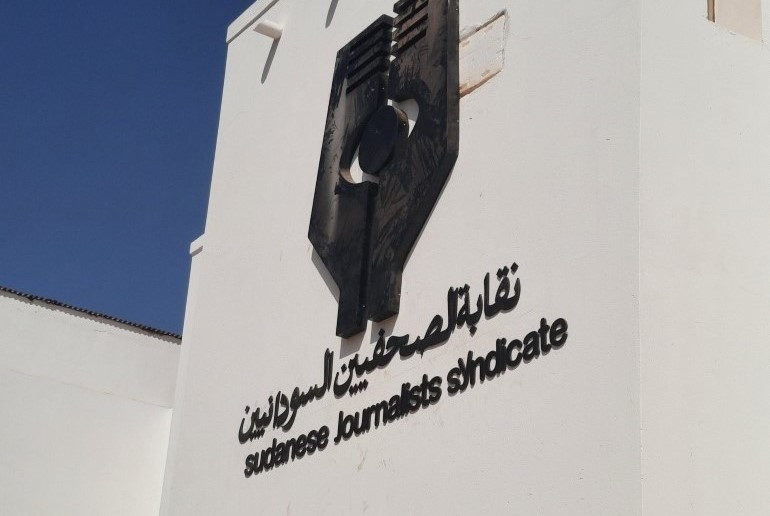Sudanese Journalists Syndicate reports killing, raids, threats in June

Sudanese Journalists Syndicate (Photo: Skyline International for Human Rights)
KHARTOUM –
In its latest monitoring report about the situation of journalists, over the second half of June, the Sudanese Journalists Syndicate says that since the war between the Sudan Armed Forces (SAF) and the Rapid Support Forces (RSF) erupted on April 15, at least 150 journalists fled their homes and sought refuge in other places in Sudan. More than 70 journalists fled to neighbouring countries. Those who attempted to do their job, were shot at, beaten, held, or threatened.
The Sudanese Journalists Syndicate (SJS) reported on Saturday that one journalist was killed in the period between June 16-30. Samaher Abdelshafee, who worked for the West Darfur Zalingei Radio, died on June 30, when the shelter she and her relatives were staying in, was hit by a shell.
Journalist Ramadan Mahjoub was held by RSF members in Khartoum. He was questioned and threatened with death before being released after hours of detention.
Eight journalists working for Al Jazeera remained stuck in the channel’s office in Khartoum, because of heavy fighting in the area. They were threatened by RSF members as well, the SJS said on Saturday.
Journalists Osama Sayed and Ahmed El Buseili were shot by snipers while they El Sitteen Street in Khartoum, an area under the control of the RSF.
An RSF force prevented a team of journalists from filming on El Sitteen Street in Khartoum, and verbally abused them.
Ali Shatta, a cameraman for the Sudanese Radio and Television Corporation was shot by RSF soldiers in his left thigh.
Journalist Khaled Saad was held by RSF members near his house. They told him to open the door at gunpoint, searched the house and beat him up.
Attacks on their home happened to at least 13 others in the Sudanese capital as well.
In Port Sudan, Red Sea state, journalist El Amin El Sheikh was beaten by policemen. He tried to file a complaint against them in vain, despite charges issued by the public prosecutor.
Journalist Ali Joude was held by Military Intelligence agents in El Obeid, capital of North Kordofan, for two hours.
Digital threats
The SJS severely condemned “the appearance of posters [on social media] accusing journalists of high treason”. Photos of the journalists are shown on the the posters as well, including former Minister of Information Feisal Mohamed Saleh and prominent journalist Zuheir El Sarraj.
This “spreading of rumours and fabricated news, and promoting racist discourses is an explicit threat to their lives”.
Journalist Omar Kamal received letters by an unknown party threatening of killing him and his family. In the letters, his family members were mentioned including their names, ages, and schools.
Radio and Television Corporation
The Sudanese Radio and Television Corporation “is still a battlefield for both sides of the conflict,” the SJS reported.
Soldiers of both warring parties have entered the buildings at the road along the Nile in old Omdurman since the beginning of the armed conflict in mid-April, “despite repeated calls to keep the conflict away from the radio and television premises, in order to preserve the archives, the ancient building and its national history”.
The SJS further reported that forces affiliated with the RSF raided the media office set up by Afraa Fatelrahman and took “all television equipment and documents”.
The premises of Istigsaai online news outlet in El Riyadh, Khartoum, “which is an RSF-controlled area” were plundered.
Permits
The SJS as well reported that a number of journalists face “great difficulties in obtaining certification from the competent authorities in El Gezira in central Sudan that would allow them to practice journalistic work”.











 and then
and then